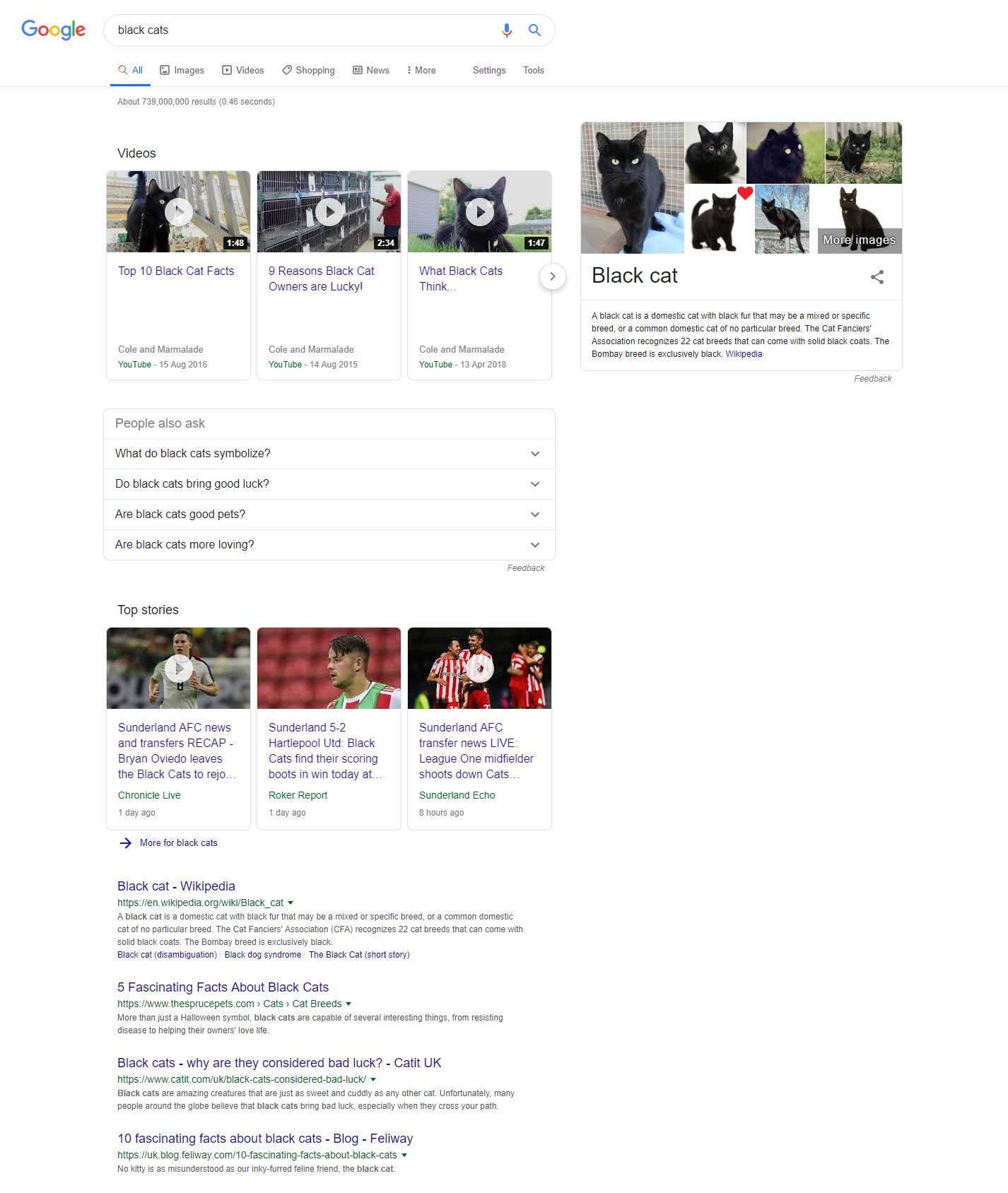30th August 2019.



That's right, Online Marketing is all connected. How so? Well I got thinking when a particular line that’s spoken within The Lion King had me thinking about all the elements of online marketing that are essentially, all connected.
As an online business, it’s important we understand these connections and why one element of digital marketing, supports the other.
Mufasa, showing his son the land he will one day rule, said;
“Everything you see exists together, in a delicate balance. As king, you need to understand that balance, and respect all the creatures-- from the crawling ant to the leaping antelope…When we die, our bodies become the grass. And the antelope eat the grass. And so we are all connected in the great Circle of Life.”
If we look at this particular quote from an online marketing point of view, you could say that certain elements all play their part in the ‘great online marketing circle of life’.

First off, I want to explain that when it comes to creating a website, it’s no good just creating the most basic (and sometimes cheapest) website you can make. For most users, your website is the first thing they see.
Regardless of whether your site is brand new or has existed for years, it’s absolutely crucial to consider usability and interface, especially in a time when Google considers over 200 factors in order to rank your website.
I’m not going to go in each ranking factor; however I want to explain that if your website doesn’t tick the boxes of some of these ranking factors, over time, your site may struggle to appear in search results due to negative user experience.
I’m going to use navigation as my main example, because navigation is extremely important. You need to ensure your product and/or service pages are easy to find when a user lands on your site. Even your contact page should be a priority; you want them to get in touch right?
Navigation is key when starting a web project. If your users spend too long (or not long enough) trying to find a service or product they’re looking for, they will simply leave your site. Which could increase your bounce rate and in the eyes of Google this could be considered a negative factor towards your website.
For example, if you go into a shop and there are no signs above the isles telling you where the butter is, eventually you will leave the shop and go find another. This decision prevented the shop from receiving your purchase, where it will be received by another store.
This principle is the same with your website. It’s all connected.
To reiterate, by creating a journey that is simple to navigate, your website will create a positive impact on several factors;
Time on site can sometimes be a complicated factor to judge. If users spend a good amount of time on your website, this will signal to Google that your page, matched their search result well.
However for certain types of searches your page may answer a users question fairly quickly and so a user may receive their answer and leave the page within seconds or stay on for a minute or so which would be considered as Dwell Time.
If you’re not sure if your website is easy to navigate, get a second opinion or perform user research to gain feedback on how easy or difficult your website is to use.
It's also worth taking into consideration the 3 Step Rule.
This method is fairly self-explanitory. In that it should take no more than 3 steps for your user to reach the product or information they are searching for.
This isn't always the case, depending on your site, however it should be a consideration when planning your site structure. At the very least it will help you to create a simpler journey through your website.
As an SEOptimser, I would tell all businesses to put real time and effort into improving their online visibility through the workings of SEO.
I say this, as it’s easy to think SEO is going to happen overnight. It doesn’t. In some cases it can take months to truly see the impact your SEO has had on your organic traffic, conversions etc.
Through my experience, I can confidently say that a well planned website does wonders for SEO. If you’ve set up your website in such a way that your main keywords have a dedicated page associated with them, you should have a good chance of ranking well for your chosen terms.
When choosing keywords that describe your products or services, any digital marketer will advise you to do keyword research. Also, it's free to do using Keyword Planner.
In this example however, i'm using Ahrefs.
This will provide you with information in regards to;
The example below shows the importance of keyword research.
The first search is just a generic search for the term ‘Blinds’ which as you can see from Ahrefs, it receives an average of 100k searches with a keyword difficulty of 52.

This is telling me that I would need around 91 backlinks in order to be in the top 10 for the keyword ‘blinds’ which, isn’t impossible, but would require a lot of outreach and time if you’re going to compete with some pretty big brands.
If your product allows you to do so, you could break the keyword down either further. Instead of simply using the most generic keyword, I’m now going to use a longer tail keyword which could be ‘Patterned Roller Blinds’ for example.
We can clearly see this keyword could provide me with a better chance of ranking.

Although it has significantly less average search volume, 2.4K is still a lot. This could then be transitioned into your SEO strategy to create a better focused product page or category filter.
Whether you’re performing keyword research for your own business or client, thinking of every possible keyword is a great way of narrowing your list down when finalising. Most tools including Google Keyword Planner and Ahrefs will also give you plenty of related phrases to ensure you don’t miss that golden keyword.
Without keyword research, how would you know what keywords provide the best results? You may think a term ranks well but there may be a better suited term that could drive more traffic and bump your page up the SERPs.
With that said, Keyword Research is also connected to Search Intent. Search is forever changing. It’s not as simple as picking a keyword and ranking for it. Now we have to consider the intent behind the keyword.
If I search for, let’s say, black cats. The search results are varied. Google wants to show me popular videos of black cats but just in case that’s not what I was searching for, it’s also provided me with relevant news stories relating to a sports team named; Black Cats.

Try it for yourself, pick a term you want to rank for or are already targeting and have a good look at what types of results come back. Are they new stories, in-depth blogs, products or service pages?
If your keyword brings back news and guides instead of service based pages, it’s clear the user intent is an informative one, where they want to learn or read about a topic before purchasing a product or enquiring about a service.
This is why providing your website with focused keywords, that have the desired search intent, will go on to benefit your content as well. If you’ve not heard the phrase ‘content is king’ (where have you been?) for most of the internet, it rings true.

Creating good copy for your website will ensure users stay engaged. Want them to convert? Create messages that make them want to convert!
When creating engaging messages for your website, you'll want to consider the length of your content, which can have a positive impact on the keywords you want to target (especially when it comes to semantics). So if you have lots to say about a particular subject – write to your heart’s content!
If you feel you can provide a straight forward answer to a query, this may also play in your favour for features snippets, which basically gives you position zero (better than 1st).
Featured snippets and rich results are becoming more and more common as Google continues to evolve it's search results to provide the most useful information to it's user.
These types of results are also great to aim for if you're struggling to reach some of the top spots. Google doesn't necessarily pick position 1 to be a featured snippet. In some cases, you could be position 2 or 3.
Combining a range of associated keywords that are nicely distributed within your content, which also proves useful to your reader, will help to increase time on site, click through rate and in turn, your search position.
These are just some of the elements you can start with to understand how your website performs. Understanding the navigation of your site, the keywords you're targeting, the intent of your keywords and the length of your content can give you an insight into how people discover and view your website.
© 2011 - 2026 SF Media Solutions Ltd. Registered Company: 7714180. VAT Number: 194859838.
Registerd Office: The Willows, Ransom Wood Business Park, Southwell Road, Mansfield, Nottinghamshire, NG21 0HJ. - View Map